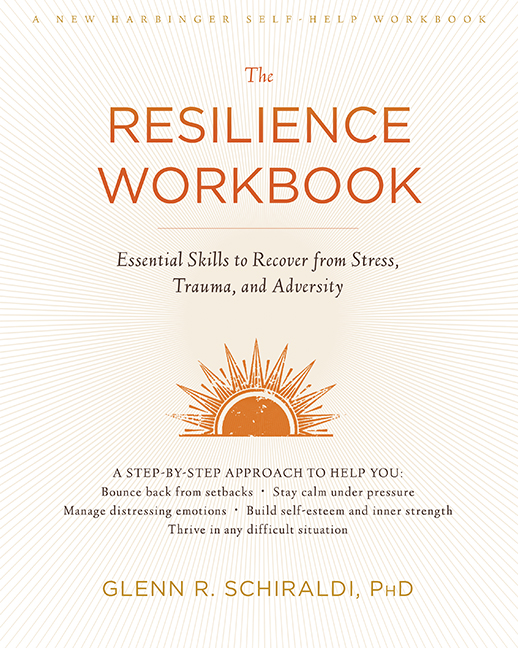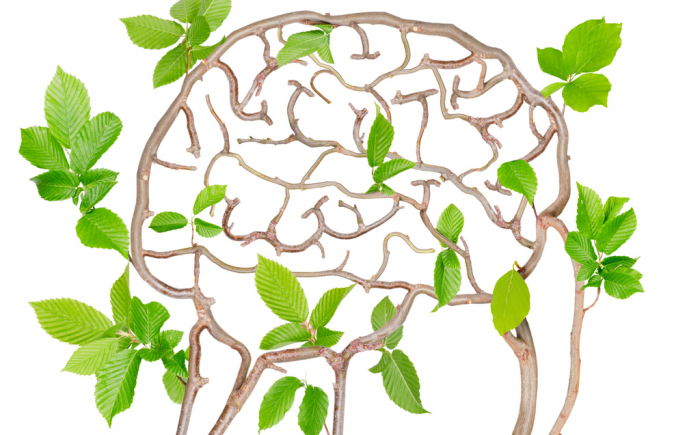by Glenn Schiraldi, PhD, author of The Resilience Workbook
Many of us, even mental health professionals, do not fully appreciate how the physical condition of the brain affects mood, performance, and the ability to heal from trauma, anxiety, depression, addictions, eating disorders, and other stress-related conditions.
Nine keys work together to optimize brain health and function, increase blood flow to the brain, reduce inflammation and oxidative stress, lengthen telomeres, remove harmful proteins from the brain, strengthen the blood/brain barrier, increase the size of regions vital to regulating memory and emotions, and improve mood and concentration. Paying attention to theses nine keys increases the likelihood that other therapeutic interventions will bear fruit. The nine keys are:
Thirty minutes of aerobic exercise all or most days
This can be as simple as taking a brisk walk. Supplementing with strength and flexibility training increases benefits.
High quality sleep
Most Americans are sleep deprived and do not realize it. The goal is to go to bed and get up at the same time every night, aiming for seven to eight-and-a-quarter hours per night for most people. Even getting twenty minutes additional sleep per night can pay off in noticeable improvements in mood and performance.
A Mediterranean-style diet
This is an eating plan that is high in plant products and fish, and low in animal fats, sugar, and salt.
Minimizing anticholinergic medications
These block a major brain neurotransmitter, and are found in prescription and over-the-counter sleep aids, tranquilizers, muscle relaxants, antihistamines, ulcer medications, and an older form of antidepressant. Explore using the minimum amounts for the shortest possible time, or switching to alternative medications or non-pharmacological treatments.
Controlling sleep apnea, hypertension, elevated cholesterol, gum disease, thyroid disorders, and diabetes
All are common and highly treatable.
Minimizing the 3 P’s: pesticides, preservatives, and pollution
This is accomplished by growing and/or preparing our own meals, purchasing organically grown produce, thoroughly washing store-bought produce, taking off shoes before entering the house (especially after walking through lawns treated with pesticides), and using high-quality air filters in the home.
Reducing substance intake
Brain imaging has shown that any drug in excess, including caffeine, nicotine, alcohol, or illegal drugs, impairs brain function—years before anatomical abnormalities become apparent.
Get about fifteen minutes of sunlight daily
This increases vitamin D, which affects brain health and function in many beneficial ways.
Manage stress
In excess, cortisol, a stress hormone, impairs and can even damage neurons. Many effective strategies reduce stress and aid the healing process, including mindfulness, self-compassion, increasing heart-rate variability, cognitive therapy, and somatically based skills. The latter help bring dysregulated arousal (stress arousal that is stuck on too high or too low) back into the resilient zone, where brain areas related to logical thinking, verbalization, and feeling connected to emotions, body, and self come back “on-line.”
When under stress, people might feel too overwhelmed to address these keys. The idea is to consider steps that one can take, and not feel that everything must be done perfectly or all at once. People often say that implementing a health plan, particularly paying attention to the first three keys, was surprisingly effective. It helps to make a written plan that is referred to frequently.
Strengthening the brain by following these nine keys prepares us to learn and effectively apply the powerful skills and principles of resilience, which promote healing and recovery, prevent relapse, and optimize mental fitness and functioning across the lifespan.
See also: What Do Resilient People Look Like?
 Glenn Schiraldi, PhD, Lt. Colonel (USAR, Ret.), is the author of The Resilience Workbook; The Self-Esteem Workbook; Ten Simple Solutions for Building Self-Esteem; The Post-Traumatic Stress Disorder Sourcebook; and nine other books on stress-related topics. Dr. Schiraldi’s books have been translated into sixteen foreign languages.
Glenn Schiraldi, PhD, Lt. Colonel (USAR, Ret.), is the author of The Resilience Workbook; The Self-Esteem Workbook; Ten Simple Solutions for Building Self-Esteem; The Post-Traumatic Stress Disorder Sourcebook; and nine other books on stress-related topics. Dr. Schiraldi’s books have been translated into sixteen foreign languages.


 2024 Peace Playbook: 3 Tactics to Avoid Clashes with Your Partner
2024 Peace Playbook: 3 Tactics to Avoid Clashes with Your Partner